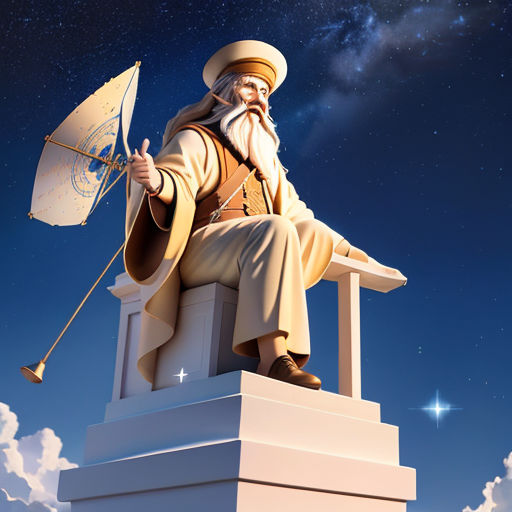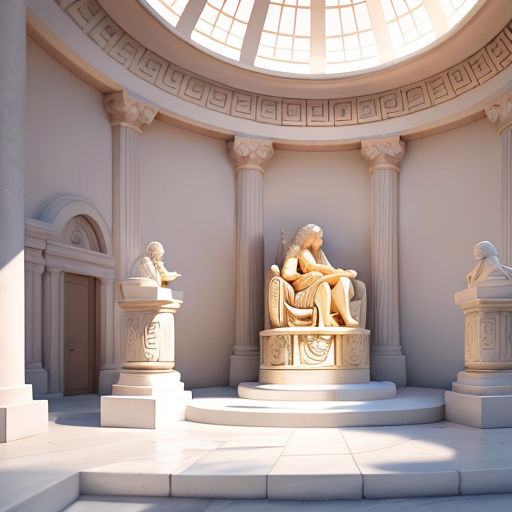
The Mathematicians of Ancient Greece
By Storybird

29 Jun, 2023

Once upon a time, around 600 BC in ancient Greece, in a society where mythology and philosophy intermingled, the birth of a new discipline called mathematics was taking place.

In the beautiful city of Miletus, a man named Thales was leading the intellectual revolution. An astronomer and philosopher, Thales was intrigued by the concept of logic and reasoning.

Thales is often considered the first true mathematician. He introduced the idea of deductive reasoning in geometry and made significant contributions in predicting the weather and interpreting celestial phenomena.

Next came Pythagoras, the man from Samos. A student of Thales, he founded a philosophical and religious school in Croton. Here, mathematics, cosmology, and music were all intertwined.

Pythagoras is best known for the Pythagorean Theorem. He believed that everything in the universe could be explained by numbers, and that they held mystical significance.

Pythagoras and his students were dedicated to learning. They lived by strict rules and required absolute secrecy. The mysteries they uncovered were not to be discussed with those outside the school.

Several centuries later came Euclid of Alexandria, the "Father of Geometry." Euclid authored 'Elements', a 13-volume work that compiled the known mathematical and geometric knowledge of the time.

'Elements' was used as a textbook for centuries, influencing the world of mathematics for more than 2000 years. It introduced the concept of an "axiomatic system", a system built from a set of basic, undeniable truths.

Euclid could prove complex theorems by building on these basic truths. This method laid the foundation for the formal structure of mathematics, an achievement that changed the world.

After Euclid, Archimedes of Syracuse emerged as another prominent figure. He was a genius in pure mathematics and practical invention, creating important theories and machines of war.

Archimedes is known for his significant contributions to the understanding of the principles of leverage, buoyancy, and the calculation of areas and volumes. His work laid the groundwork for calculus.

Archimedes also invented the Archimedes Screw, a machine for lifting water, which is still in use today. His ingenious inventions showcased the power and practicality of mathematics.

In the 3rd century BC, Apollonius of Perga made significant progress in geometry. His eight-volume work, 'Conics', gave us the terms 'ellipse', 'parabola', and 'hyperbola'.

His work later influenced the astronomical theories of Copernicus, Galileo, and Kepler. His contributions to geometry helped lay the groundwork for modern physics.

In the 4th century AD, the star of Diophantus of Alexandria lit the mathematical world. Known as the father of algebra, he made significant strides in number theory and algebraic notation.

His thirteen-volume work, 'Arithmetica', contains the earliest known use of symbols to represent unknown quantities, a fundamental aspect of algebra. His work gave birth to Diophantine equations, still studied today.

The legacy of these men and others shaped Greek mathematics, a beacon of human intellect. Their depth of thought, rigor, and creativity established Greece as the epicenter of ancient scientific inquiry.

The Greeks coupled mathematics with philosophy, exploring the nature of knowledge, thought, and the universe. They believed the pursuit of knowledge was a noble and important endeavor.

They proved that human intellect, when committed to inquiry and reason, can decode the universe's truths. Their work lit the torch of knowledge for future generations to carry.

These ancient Greek mathematicians didn't just create theorems and proofs; they crafted a new way of thinking that changed the world. Their legacy persists in the modern world, underpinning our technological society.

Today, their influence can be seen everywhere: in the blueprints of engineering, in the algorithms of computers, in the calculations of physics, and even in the theories of modern cosmology.

Long ago in ancient Greece, the seeds of mathematical thought were sown. Today, those seeds have become a mighty forest that shelters our technologically advanced civilization.

The story of ancient Greek mathematicians is not only about solving equations or proving theorems. It's about the power of human intellect and the universal language of mathematics that transcends time.

Their story is about the unending pursuit of knowledge, the joy of discovery, and the unquenchable spirit of inquiry that continue to inspire countless scientists and mathematicians even today.

The ancient Greeks planted the saplings of knowledge that have grown into mighty oaks. Their legacy, embodied in our modern world, is a testament to the enduring power of human discovery.